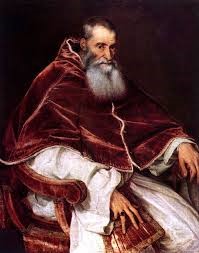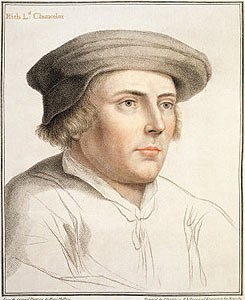Thomas Cromwell: Life Story
Chapter 7 : Dealing with Dissent (1534 - 1535)
The final annulment of Henry’s first marriage brought the case of Elizabeth Barton, known as the Nun of Kent, to a head, and Cromwell was involved in the examination and punishment of an alleged group of traitors. Barton, a serving-woman in Canterbury, began to have visions of the Virgin Mary and other saints in 1525, following a serious illness. She was examined by the local priest and Archbishop Warham himself. Found to be a woman of virtue and blameless life, she was encouraged to become a nun. Over the following years, her prophecies and visions drew a large audience. She was even consulted by Wolsey and the King himself.
Barton’s prophecies were all very conservative, discouraging Lutheranism, and supporting traditional practices – pleasing to Henry in a time when he was strongly anti-Lutheran himself. However, as the annulment case became public knowledge, Barton preached against it and drew down the wrath of Henry on both herself, and any who had listened to her. The list of her patrons included a number of high-ranking courtiers who were supporters of Katharine of Aragon, including Bishop Fisher of Rochester and Gertrude, Marchioness of Exeter.
The Nun was arrested and accused not only of leading an immoral life, but also of having made up her prophecies, under the orders of her priests. In a shameless display of greed, one of the chief accusers was Friar John Laurence who gave evidence against both her, and several of his brother friars, whilst asking to be granted the office that one of the accused would no longer need after being hanged. The Nun and five others were hanged at Tyburn and her supporters in court circles were under suspicion for some time.
Henry’s chief objective of marriage to Anne achieved, there was no time for Cromwell, now acknowledged as his chief minister, to rest. The 1534 Parliament bristled with bills stopping payments to Rome, ensuring the cathedrals were brought under the King’s jurisdiction, and, ominously, empowering the crown to ‘visit’ (monitor) the monasteries. It was stated that this throwing off of Papal Supremacy was not to be taken to mean that England was departing from the ‘articles of the Catholic faith of Christendom’ and, at this stage, no changes in religious practice were suggested.
Henry’s chief objective of marriage to Anne achieved, there was no time for Cromwell, now acknowledged as his chief minister, to rest. The 1534 Parliament bristled with bills stopping payments to Rome, ensuring the cathedrals were brought under the King’s jurisdiction, and, ominously, empowering the crown to ‘visit’ (monitor) the monasteries. It was stated that this throwing off of Papal Supremacy was not to be taken to mean that England was departing from the ‘articles of the Catholic faith of Christendom’ and, at this stage, no changes in religious practice were suggested.
The next important piece of legislation that Cromwell shepherded through Parliament in 1534 was the Act of Succession which, after a preamble denying papal supremacy, settled the succession on the children of Henry and his new queen, Anne’s heirs male, and thereafter on the heirs of any subsequent wife. Any subject over the age of fourteen could be called upon to swear an oath to uphold the Act.
It was decided that John Fisher, Bishop of Rochester, who had vigorously defended the marriage of Henry and Katharine, and Sir Thomas More, former Lord Chancellor, who was believed to be opposed to the Royal Supremacy, would be asked to swear the oath. Both men refused. Fisher boldly stated his grounds, and confirmed that he would sign an oath upholding the succession in accordance with the will of Parliament and the King, but would not deny Papal Supremacy. More also confirmed that he would swear to the proposed succession, but he would not sign the oath as it stood, although he gave no statement as to what he found objectionable. Both men were attainted in November 1534 and were sent to the Tower to think on their answers. Naturally, their property was confiscated.
At the end of the 1534 session of Parliament, three final Acts were drafted by Cromwell and Audley. The Act of Supremacy, which spelt out Royal Supremacy, rather than it just being part of the Act of Succession, the Treasons Act, which enlarged the concept of treason from acts to words, and a revised Act relating to annates, that began an audit of monastery land, through a Royal Commission. This session also introduced the acts which effectively amalgamated Wales into England, and created a unified state.
Early 1535 was taken up with matter of Bishop Fisher and Sir Thomas More. They were both still in the Tower, refusing to swear the oath of succession. More and Fisher were highly respected at home and abroad as pious, learned and virtuous. Our modern unease with More’s treatment of ‘heretics’ did not raise any such doubts at the time. Repeatedly, Cromwell put pressure on them both.
On 7th May, 1535, he led a delegation to the Tower to request More to give his opinion on the Act of Supremacy, as the King had asked for it. More refused to discuss the matter, saying he had told the King and Cromwell what he thought when the matter was first mooted, and would say no more on the topic. Cromwell appears to have used his best endeavours to persuade More to accept the oath, saying the King would be merciful, and pointing out that, just because he was in prison, he need not think he could escape from obedience to the King. Cromwell then complained that More was encouraging others to disobey by his obstinacy. More only replied that
‘I do nobody harm, I say none harm, I think none harm but wish everybody good. And if this be not enough to keep a man alive, in good faith, I long not to live. And I am dying already…And therefore my poor body is at the King’s pleasure: would God my death might do him good.’
Cromwell spoke ‘full gently’ on hearing this, and assured More that nothing he had said would be taken advantage of.
However, Henry was not to be satisfied. On 3rd June, Cromwell returned, in a very much sterner mood. Pope Paul III, in a misguided attempt to improve the lot of Bishop Fisher, had created him a Cardinal. Henry was beside himself with rage, seeing the honouring of a disobedient subject as a deliberate provocation. He was determined that Fisher and More would conform.

The delegation, led by Cromwell, consisted this time of Lord Chancellor Audley, the Duke of Suffolk (Henry’s brother-in-law) and the Earl of Wiltshire, Queen Anne’s father. The men had a copy of the oath with them, and attempted to coerce More into either signing, or saying something treasonable that would call down the new Treason Act upon him. More was obdurate, and Cromwell was frustrated, telling More he liked him ‘much worse’ than before. The Councillors then departed, and sent Sir Richard Rich, the Solicitor General, to remove More’s books.

Cromwell drew up an indictment upon which More was tried at Westminster Hall. The first three counts of the indictment that effectively assumed guilt from refusal to give a reason for not signing the oath were dismissed by the court. The final charge was then the only matter left.
This charge, sworn to by Richard Rich, was that in a discussion about hypothetical cases, More had denied the Royal Supremacy. There were no other witnesses than the two men. More pointed out that, if he had not answered the King or his Councillors, he certainly wouldn’t have shared his inmost thoughts with Rich, whom he heartily despised and accused of perjury.
The court returned a guilty verdict and More was beheaded on 6th July 1535, just after Bishop Fisher. So far as Cromwell was concerned, it was a job well done, even if he might have preferred Fisher and More to swear the oath to reduce opposition to the King.




